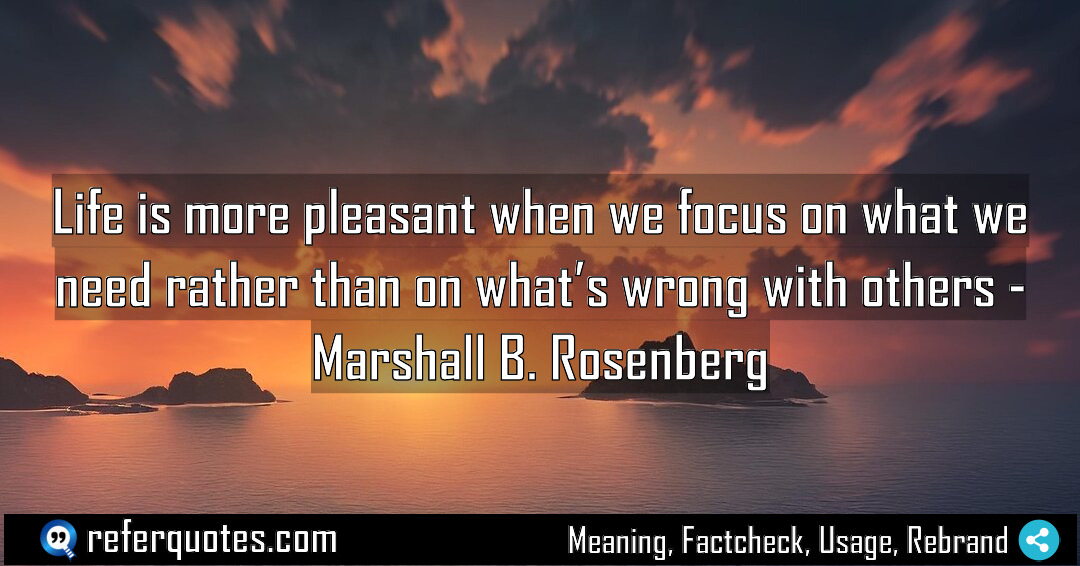
Life is more pleasant when we focus on what we need. It’s a simple but profound shift that turns frustration into clarity and blame into actionable steps. This idea, from Marshall Rosenberg, is the secret to less conflict and more peace.
Share Image Quote:
Table of Contents
Meaning
At its core, this quote is about a radical shift in attention: from diagnosing others to understanding ourselves.
Explanation
Okay, let me break this down because it sounds simple, but it’s a game-changer. We’re wired, especially when stressed, to look outward. Someone cuts us off in traffic, a colleague drops the ball, a partner says the wrong thing… and our brain instantly goes into detective mode to figure out what’s wrong with them. It’s a blame-based operating system. And it’s exhausting. Rosenberg’s genius was flipping the script. He says, stop being an auditor of other people’s faults and start being a detective of your own feelings and needs. That frustration with your colleague? It’s not really about their incompetence; it’s about your need for reliability and support. That anger in traffic? It’s about your need for safety and respect. When you make that internal pivot, the entire conflict loses its charge. You’re no longer a victim of their behavior; you’re a person with unmet needs that you can now take responsibility for addressing. It’s the difference between shouting at the darkness and simply turning on a light.
Quote Summary
Reading Level70
Aesthetic Score75
Origin & Factcheck
This is straight from the source. It appears in Marshall B. Rosenberg’s seminal 1999 book, Nonviolent Communication: A Language of Life, which he developed over decades of work in the United States. You won’t find it credibly attributed to anyone else; this is pure Rosenberg.
Attribution Summary
Where is this quotation located?
| Quotation | Life is more pleasant when we focus on what we need rather than on what’s wrong with others |
| Book Details | Publication Year: 1999; ISBN: 9781892005038; Last edition: 3rd Edition (2015); Number of pages: 264. |
| Where is it? | Chapter 6: Requesting That Which Would Enrich Life, Page 100 (2015 edition) |
Context
In the book, this isn’t just a feel-good tip. It’s a critical component of the Nonviolent Communication (NVC) model, sitting right between observing a situation without judgment and clearly expressing your own feelings. It’s the crucial internal step that prevents observation from turning into criticism.
Usage Examples
So how do you actually use this? Let’s get practical.
- In a team meeting: Instead of thinking “Mark is so dismissive of my ideas,” you pivot to “I have a need to be heard and contribute. How can I express my idea in a way that connects?”
- With a partner: Instead of “You never help with the dishes!” you explore “My need for partnership and shared responsibility isn’t being met. Can we find a system that works for both of us?”
- For leaders and managers: This is pure gold. It transforms your leadership from micromanaging to empowering. You stop focusing on what’s wrong with an employee’s performance and start focusing on what they need to succeed—be it clearer guidance, more resources, or specific feedback.
To whom it appeals?
Share This Quote Image & Motivate
Motivation Score80
Popularity Score85
Shareability Score80
FAQ
Question: Isn’t this just letting people off the hook for bad behavior?
Answer: Not at all. In fact, it’s the opposite. By understanding your own needs, you can make a clear, powerful request for change. “When you are late, I feel frustrated because I need respect for my time. Would you be willing to text me if you’re running behind?” That’s far more effective than “You’re so irresponsible!”
Question: What if my need is for the other person to change?
Answer: Great question. This is where it gets deep. Rosenberg would guide you to dig deeper. If your “need” is for them to change, that’s still a strategy focused on them. What is the feeling you hope to get from that change? Peace? Respect? Connection? That’s the actual need. Focus on that.
Question: This seems too soft for a competitive business environment.
Answer: I used to think that too. But it’s actually a high-performance framework. It eliminates the drama and wasted energy of office politics and blame games. It gets teams focused on solutions and shared needs—like efficiency, clarity, and innovation—which is exactly what drives real business results.
Similar Quotes
You know, the more we are connected to our feelings, the more we stop fighting ourselves and start making choices that genuinely serve us. It’s like having an internal compass…
When we help ourselves, we find moments of happiness… but it’s helping others that unlocks a deeper, lasting sense of fulfillment. It’s the difference between a quick hit and a…
When the environment is filled with danger, we become selfish. It’s a primal switch that flips inside of us. Understanding this is the key to building teams that actually trust…
You know, “The quality of your life is determined by” your mindset more than your circumstances. It’s a powerful truth that shifts the focus from what’s happening *to* you to…
Look, if you really sit with Tony Robbins’ idea that “Life is a gift…” it reframes everything. It’s not about just taking; it’s about your active, ongoing contribution to the…
